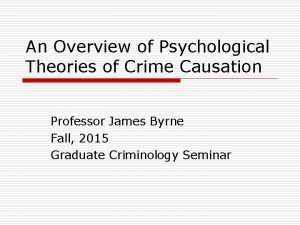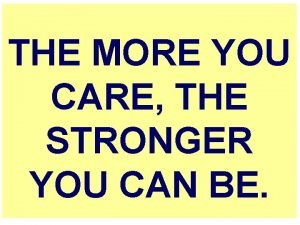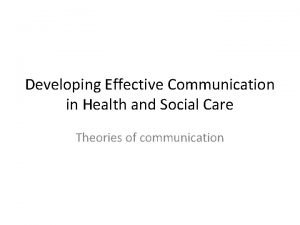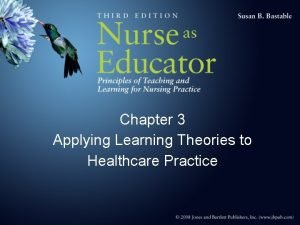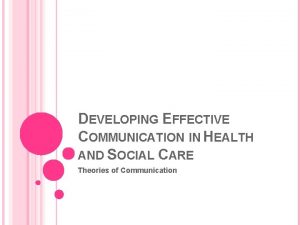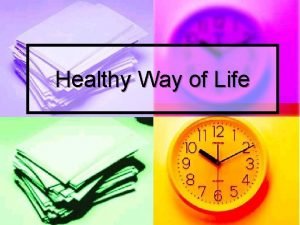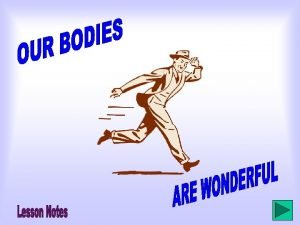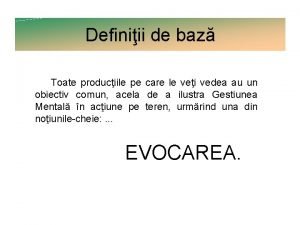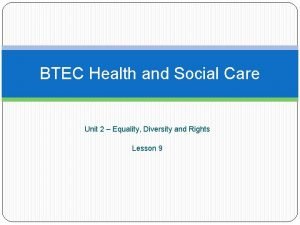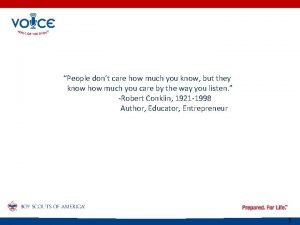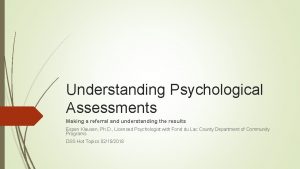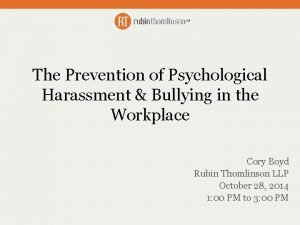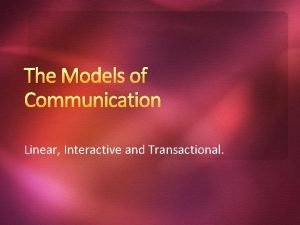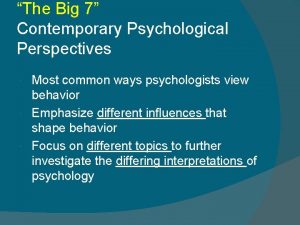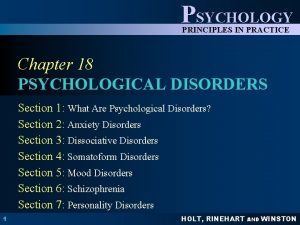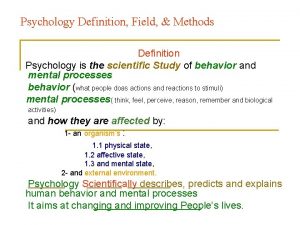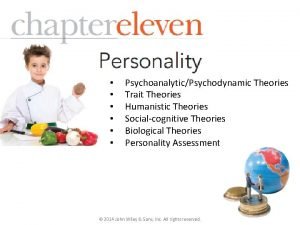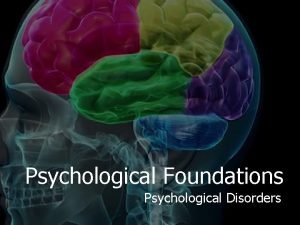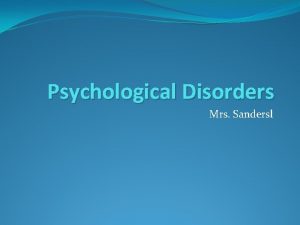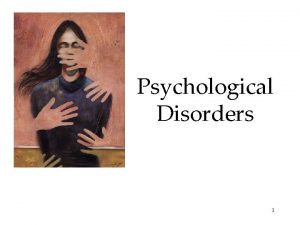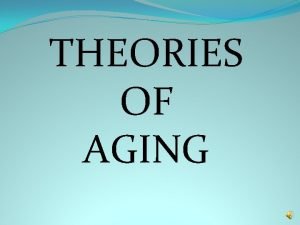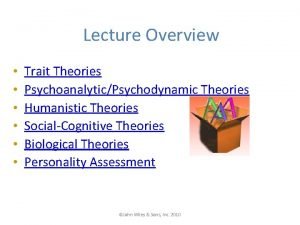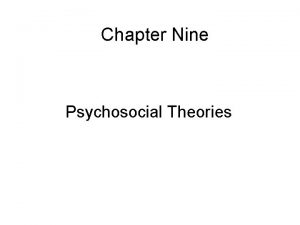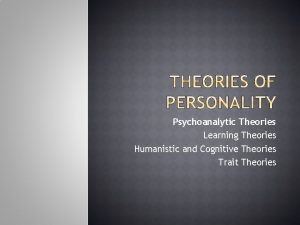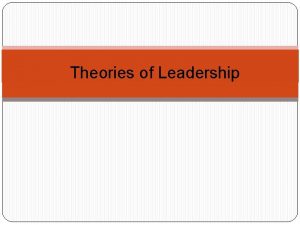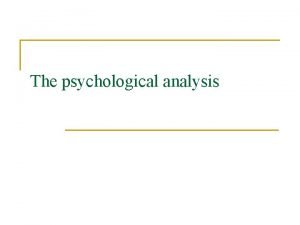CARE HIGHER 3 Psychological theories Psychological theories you





































- Slides: 37

CARE HIGHER 3. Psychological theories

Psychological theories you will study: • Person-centred theory (Rogers) • Transition (Adam, Hayes and Hopson) • Loss (Colin Murray Parkes and William Worden)

Carl Rogers (1902 -1987) PERSON-CENTRED THEORY

Roger’s believed: • You had to look at all aspects of a person to help them understand themselves fully. • If the person could clearly understand, accept and express their thoughts and feelings openly, then they would have the possibility of developing psychological health.

A good care service…. …. may be one of the places where the person can discover more about what they are capable of, because they receive the support and conditions that enable them to discover their interests and abilities.

Rogers believes that the person is the expert in their own life • (not any family members, friends, professionals or workers who happen to be in contact with them) • It is up to helpers to understand the world from the person’s point of view if they are going to be able to help themselves.

The role of a care worker • Is to help the person understand their thoughts and feelings, and gain the strength to make the decisions and take the actions that would enable them to lead a more fulfilling life. • Is not to diagnose or assess the client, but it is the role of the care worker to encourage the person to understand themselves and grow.

• According to humanistic theories we, ourselves, are largely responsible for what happens to us. • People have free will and the capacity to make decisions and choices. • We are able to change and adjust to circumstances, given the right conditions.

Carl Rogers and Person Centred Theory • Carl Rogers called people who enjoy life to the full ‘fully functioning people’. • They are seen to be psychologically healthy people. • In order to achieve psychological health, people need to have a positive self-concept, which is based on not having too many conditions of worth imposed on them, and receiving the core conditions from people they interact with.

Self concept Self-image Self-esteem The way a person sees him or her self The value a person puts on him or her self Ideal Self The way a person would like to be

Our self-image is the picture we have of ourselves: • It is made up of our qualities (funny, serious, trustworthy, impatient) our body image (fat, thin, attractive) and our roles (sister, friend, husband). • It is OUR picture of what we think we are like – other people may disagree, but it is our internal picture, and so it is the point of view we act from

Our ideal-self is the picture of who we would like to be Perhaps sportier, or more organized, or more courageous, or more able to speak out in class. A lot of psychological discontent is caused because our picture of who we are (self-image) doesn’t match up to our picture of who we would like to be (ideal-self).

Self-esteem – how we feel about ourselves • How we feel about ourselves (our self-esteem) is likely to be low if our self-image and ideal-self are too far apart. • Equally, we are likely to feel good about ourselves and have high self-esteem if our self-image is close to our ideal-self.

How can we achieve higher self-esteem?

Sometimes, having a gap between who we are and who we want to be can act as a motivation for change. • We all have different dreams, hopes and goals: perhaps to go to college, visit the gym more regularly or travel the world a bit. • These are useful when they are our own goals, and when they are achievable. • What goals and dreams do you have?

However, for many of us they are not actually our goals • They are the goals and dreams of our parents, friends, or partner. • Another way to increase our selfesteem therefore would be to re-assess our ideal-self.

• Why do we have goals which are unrealistic and keep us in a constant state of depression or discontentment because we will never be able to achieve them? • Are they really what we want to do, or are we just fitting in with other people’s expectations and someone else’s dream?

Conditions of Worth and Locus of Evaluation • Many of us lose touch, sometimes from an early age, with what we actually think and feel, because of the pressure we get to fit in with what our family and friends expect of us. • This is what becoming a member of our family, community and society is all about: we are socialised into a particular culture. • This is an essential part of learning how to fit in with others and get on in life.

• However, in many cases, it moves us away from what makes us a unique individual. We are expected to conform to what a girl/boy, Christian/Muslim, Scottish/Irish person should do. In a lot of cases, we want to do this, as it gives us our sense of identity.

But in some cases, the identity belongs to the your ‘tribe’. Adolescents struggle to find who they are and where they fit in – in amongst all the messages they get from school, the media, family, friends and their hormones! • You get conditions of worth from people around you: you are acceptable if you fit in with their picture of you, not if you act as an individual. • We all have to work through this process of learning to fit in with others, but also letting our own personality and spirit shine through.

We spend a lot of our life fitting in with other people’s expectations • If people only show us love and respect when we say and do what they want, then they are attaching conditions of worth to our relationship. • Their acceptance of us is conditional on us getting into their scheme of things conditional love happens throughout our life.

Rogers calls this having an internal locus of evaluation. • If we are too influenced by people and things outside us, we have an external locus of evaluation – you just go along with the crowd. • This could easily happen to people in care settings where there is the possibility that decisions are made about people rather than with people, if their needs are not understood and people don’t make an effort to actively involve service users in the care process.

• Good care services will ensure that service users – and staff – have an internal locus of evaluation - know their own mind, voice their opinions. • We feel good about ourselves and in control – not needing to change our behaviour to be liked.

Core Conditions: Acceptance, Genuineness and Empathy • So how do we get an internal locus of evaluation? • If people who are important to us communicate by words and actions that we are respected and loved, regardless of what we say or do, then we have their unconditional positive regard. • This allows us to develop high self-esteem and self-acceptance. They might not approve of what we do, but they can see that it is what we need to do at that time.

Roger’s ideal helping relationship Showing: • unconditional positive regard (acceptance) • congruence (genuineness) • empathy (understanding) • Being natural and sincere helps service users feel that they are genuine and trustworthy. • If the worker attempts to see the world from the point of view of the service user by using empathy, then the service user will feel understood, and that they matter. • Someone has taken the time to get to know and appreciate them as a unique individual.

People also need to be able to do these things for themselves: • accepting of themselves (not making unrealistic demands of themselves or others and not having an unachievable ideal-self) • genuine (open and sincere with themselves and others) • empathic (clear about their own point of view, but not needing to impose it on others. Able to see that other people might have their own point of view which is different, but equally valid: ‘live and let live’)

THIS PART OF THE UNIT IS ABOUT: Life experiences and how they effect individuals. The life experiences people using care experiences may encounter, e. g. relationships, health, employment. Using models of transition or loss to explain these experiences.

Theories of life change • Transition: Adams, Hayes and Hopson • Loss: Colin Murray Parkes and William Worden. • Meaning of transition and loss

How is this relevant to care? People we work with are undergoing many changes – what examples can you think of?

Life events can be expected or unexpected, positive or negative • Relationships – marriage, divorce, parenthood. • Change in health status – illness, disability. • Employment – starting work, redundancy, retirement.

Activity: Types of Change • Think about both wanted and unwanted changes you have experienced – complete the activity sheet. • Consider the thoughts, feelings and behaviours associated with these changes – add to the class list on the board.

1. Transition: Adams, Hayes and Hopson • Seven stages • Very interested in how self-esteem is affected at each stage • seven stages: Immobilisation, Minimisation, Depression, Acceptance of Reality, Testing, Searching for meaning, Internalisation

Figure 3 shows the range of stages • The range of feelings is normal. • Sometimes people become ‘stuck’ at a stage. • You can have good and bad days.

2. Loss: Colin Murray Parkes • The pain and distress of grieving happens throughout life, and we will feel emotional pain • We are not going ‘mad’ and it should not be medicalised

Four phases of grief • four phases: Numbness, Searching and Pining, Depression, Recovery • Not ‘fixed’, can move between them, or experience more than one at a time

Determinants of grief • He believed these would the extent and depth of grieving • Also affected by the types of attachments people have, in their past and with the lost person • Look at the factors in your handout.

3. William Worden: Four Tasks of Mourning Things you have to do to cope with the loss: • accept the reality of the loss • work through the pain of grief • adjust to an environment in which the deceased is missing • emotionally relocate the deceased and move on with life
 Primary secondary and tertiary health care
Primary secondary and tertiary health care Psychological theories of crime causation
Psychological theories of crime causation Hillsong young & free aodhan king
Hillsong young & free aodhan king Standardasation
Standardasation Theories of group living in residential care
Theories of group living in residential care Michael argyle communication cycle
Michael argyle communication cycle Applying learning theories to healthcare practice quizlet
Applying learning theories to healthcare practice quizlet Theories of communication in health and social care
Theories of communication in health and social care Do you love rain
Do you love rain Eat meals that are nutritious agree or disagree
Eat meals that are nutritious agree or disagree If you think you can you can poem
If you think you can you can poem Tell me what you eat and i shall tell you what you are
Tell me what you eat and i shall tell you what you are Wherever you go i will follow whenever you know
Wherever you go i will follow whenever you know Standard 3 duty of care
Standard 3 duty of care Magnetii au proprietatea de a atrage corpuri care contin
Magnetii au proprietatea de a atrage corpuri care contin Palliative care vs hospice care
Palliative care vs hospice care Mamiferele se înmulțesc prin ouă
Mamiferele se înmulțesc prin ouă Care sunt simturile prin care sunt evocate
Care sunt simturile prin care sunt evocate Care certificate 13 answers
Care certificate 13 answers Hip fracture care clinical care standard
Hip fracture care clinical care standard Care value base health and social care
Care value base health and social care We'll always care about you
We'll always care about you When upon life's billows song
When upon life's billows song You should always seek professional medical care for
You should always seek professional medical care for Dkv you drive we care
Dkv you drive we care People dont care
People dont care God will take care of you
God will take care of you Youhol
Youhol Milton dehn
Milton dehn Referral question example
Referral question example Very superior intelligence
Very superior intelligence Marsh et al
Marsh et al Linear interactional and transactional
Linear interactional and transactional Psychological perspectives
Psychological perspectives Psychological testing examples
Psychological testing examples Medical model psychology
Medical model psychology Educational psychology definition
Educational psychology definition Psychological drama definition
Psychological drama definition

